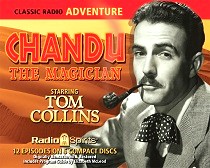
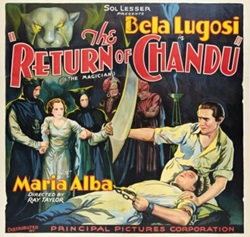 Chandu the Magician (1932-35, 1948-50) aired “Temple Under the Sea” on November 26, 1949 as the renumbered 2nd of the 6 half-hour episodes that picked up in November to finish 1949 after its hiatus in May of that year. This is only the 3rd episode of Chandu we’ve offered since the first in April of 2023.
Chandu the Magician (1932-35, 1948-50) aired “Temple Under the Sea” on November 26, 1949 as the renumbered 2nd of the 6 half-hour episodes that picked up in November to finish 1949 after its hiatus in May of that year. This is only the 3rd episode of Chandu we’ve offered since the first in April of 2023.
The first run (1932-35) consisted of daily 15-minute episodes that became popular very quickly, so much so that a 1932 film soon followed the radio adventures of Chandu. The idea behind Chandu the Magician stemmed from the public’s interest at the time with Eastern mysticism and the occult. The Chandu character’s fictional real life name is Frank Chandler. Chandler has spent many years in the Orient studying the mystic arts and is now adept at astral projection, conjuring illusions, and teleportation among other magical abilities he uses when necessary. If this sounds like a familiar set of superpowers it was, witness magazine and radio close contemporaries like the Shadow or Mandrake the Magician—though Chandu on radio was the first. The original story arc sees Chandu chasing after the evil Roxor, who has kidnapped the husband of Chandu’s sister, Dorothy Regent. Chandu and his sister travel to all sorts of exotic locales in search of her husband (who was thought to have disappeared in a shipwreck but later to have disappeared at the hands of Roxor). Roxor, as all truly evil villains are, is bent on conquering the 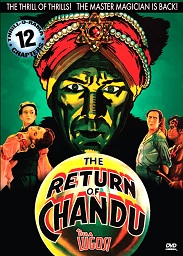 world and will stop at nothing to accomplish his egomaniacal ends. For the original 1932 movie, actor Edmund Lowe played Chandu, while none other than Bela Lugosi took the role of Roxor. For the 1934 sequel, however, in a surprising role reversal Lugosi was honored with the role of Chandu.
world and will stop at nothing to accomplish his egomaniacal ends. For the original 1932 movie, actor Edmund Lowe played Chandu, while none other than Bela Lugosi took the role of Roxor. For the 1934 sequel, however, in a surprising role reversal Lugosi was honored with the role of Chandu.
A crucial bit of the history of the show would be incomplete without mentioning that a great part of the radio show’s success was due to a young woman by the name of Vera Oldham, a former office girl who proved good on her aspirations to write. After the radio series ended in 1935 and the Chandu films were long over, Chandu was resurrected on radio in 1948, with the former story arc refurbished and updated (even bringing back Oldham to touch up the scripts), continuing Chandu’s travels to mysterious and little known parts of the world (the fabled land of Lemuria for one), and gifting him with a love interest of surpassing beauty in the character of the Egyptian princess Nadji.
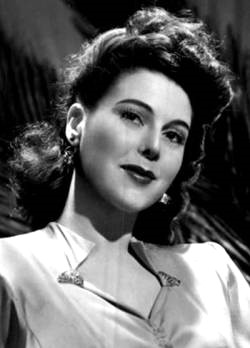
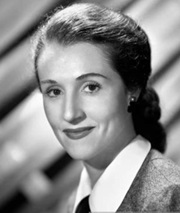 For the 1948-50 radio revival, the episodes from June of 1948 through the end of January 1949 were daily 15-minute episodes, then from February of 1949 through the final show on September 6, 1950 Chandu would become full half hour, self-contained stories, of which this week’s episode is one. Tom Collins (1913-73, photo top left) would become the new voice of Chandu, Irene Tedrow (1907-1995, photo at right) played his sister Dorothy, and film actress Veola Vonn (1918-1995, photo at left) was Princess Nadji. While Dorothy appears in this episode, Princess Nadji does not. Besides her dual careers in radio and film, Tedrow would also make a name for herself in television, appearing in dozens of shows, a very few among them being Dennis the Menace (1959-63, 26 episodes as Mrs. Lucy Elkins), Dragnet, Leave it to Beaver, The Twilight Zone (episode “Walking Distance” from October 30, 1959; ranked as the 9th best TZ episode of all time), Perry Mason, Wagon Train, Bonanza, The Andy Griffith Show, The Fugitive, Hogan’s Heroes, Kung Fu, Magnum P.I., L.A. Law, and a veritable host of others. In 1939 Tedrow married William Kent, a refugee who came to the United States to escape Nazi Germany. He passed away in 1974. Tedrow died on March 10, 1995 in Hollywood from complications arising from a stroke. She was 87.
For the 1948-50 radio revival, the episodes from June of 1948 through the end of January 1949 were daily 15-minute episodes, then from February of 1949 through the final show on September 6, 1950 Chandu would become full half hour, self-contained stories, of which this week’s episode is one. Tom Collins (1913-73, photo top left) would become the new voice of Chandu, Irene Tedrow (1907-1995, photo at right) played his sister Dorothy, and film actress Veola Vonn (1918-1995, photo at left) was Princess Nadji. While Dorothy appears in this episode, Princess Nadji does not. Besides her dual careers in radio and film, Tedrow would also make a name for herself in television, appearing in dozens of shows, a very few among them being Dennis the Menace (1959-63, 26 episodes as Mrs. Lucy Elkins), Dragnet, Leave it to Beaver, The Twilight Zone (episode “Walking Distance” from October 30, 1959; ranked as the 9th best TZ episode of all time), Perry Mason, Wagon Train, Bonanza, The Andy Griffith Show, The Fugitive, Hogan’s Heroes, Kung Fu, Magnum P.I., L.A. Law, and a veritable host of others. In 1939 Tedrow married William Kent, a refugee who came to the United States to escape Nazi Germany. He passed away in 1974. Tedrow died on March 10, 1995 in Hollywood from complications arising from a stroke. She was 87.
“Temple Under the Sea” drips with the historic atmosphere of ancient Egypt. The well-timed sound effects, descriptions of places and buildings, time-shrouded tales of magicians, visions seen in terrifying dreams, and the mystery involving a number of men gone missing into an unknown place from which none have returned, all contribute to the feeling of dread and fear, as Chandu must find where the missing men have gone and what mortal secret has drawn them to the “Temple Under the Sea.”
Play Time: 28:03
{This episode of Chandu the Magician aired on a Saturday night in late November of 1949.The previous Thursday had been Thanksgiving, and while as a group the neighborhood gang loved turkey and Thanksgiving dinner with all the trimmings, they were already getting tired of leftover turkey sandwiches. The next morning after church and following a quick change of clothes and some lunch, they headed straight for the corner newsstand to see if they could find something worth bringing home. Though they were caught up on their favorite SF and Detective pulps they yet found a varied selection that looked to be what they were looking for. Action Stories (1921-50) was one of several multi-genre magazines which meant readers knew the odds of becoming bored were small, thus the magazine thrived for 224 issues over its 30-year lifespan. It held to an unbroken monthly schedule through 1932, but over time flirted with irregular, bi-monthly, and quarterly schedules. It was a quarterly in 1949, its penultimate year of publication. All-Story Detective (1949-51) arrived late to the pulp detective party, at a time when most detective pulps had either already folded or were about to do so in a few short years. After its first 6 issues it changed its name to 15 Story Detective for its final 9 issues, the last coming in July of 1951. One reputable source notes that the magazine’s claim to fame was its stories by John D. MacDonald, though the magazine as a whole offered otherwise competent fare. It was a bi-monthly in 1949. Big-Book Western (1933-54) breathed life in the dangerously thin air of the publishing world for over 20 years. After its first 9 years of a highly irregular schedule it settled into a predictable bi-monthly run for 6 more years before becoming a regular monthly publication until 1949, where it managed only 8 issues, the first 4 as monthlies and the final 4 of the year as a bi-monthly again. While western fans would bemoan its demise in 1954 they could rejoice when television in the 1950s would offer a plethora of western programming, enough to satisfy the most ardent fan of the genre.}
[Left: Action Stories, Winter/49 – Center: All-Story Detective, 12/49 – Right: Big-Book Western, 10/49]
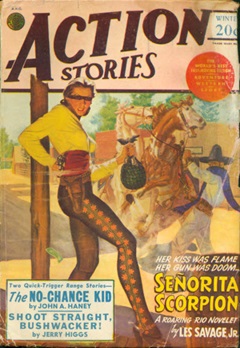
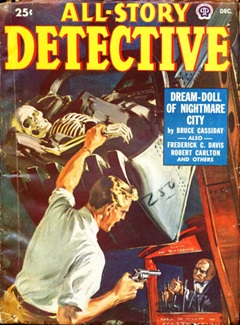

To view the entire list of weekly Old Time Radio episodes at Tangent Online, click here.